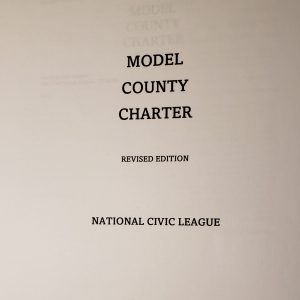South Dakota counties are structured and operate in accordance with state law. But it’s a one size fits all model that doesn’t fit our county well. With roughly a quarter of the state’s population, Minnehaha County would be better served by a more flexible approach.
Many Department Heads Are Elected
Minnehaha County is required by state law to fill too many department head positions by election. Department heads should be hired based on their education, training and experience, not elected based upon their political connections.

The state’s model stipulates that counties elect five commissioners (legislators), a sheriff, a state’s attorney, a treasurer, an auditor and a register of deeds. Inattentive voters are somehow supposed to evaluate the professional qualifications of the people running for all of those positions.
By contrast, the county commission appoints or hires the county administrator, the director of equalization and the director of human resources. That approach makes more sense.
More Local Control
South Dakota’s statutes include numerous detailed rules on how things should be done by local governments. But those rules don’t always seem appropriate. That’s why the state’s constitution gives cities and counties the ability to adopt home rule charters to provide them more freedom to operate in ways that make sense for their circumstances. It permits increased local control.

Home rule charters have been successfully adopted in Sioux Falls, Aberdeen, Brookings, Watertown, Pierre and five other South Dakota cities. Sioux Falls has thrived under the home rule government adopted by voters in 1994.
Sioux Falls voters got rid of a system where city commissioners were elected to fill supervisory and management positions, just like in our county today. It did not work well. Underqualified people ran and were sometimes elected.
I understand the county tried to adopt a home rule charter a couple decades ago. But it reportedly failed because the model proposed didn’t address the efficiency issue and wasn’t well promoted. It’s time to try again and to do it right this time.

National Civic League’s Model County Charter
The county commission has the authority to approve a charter and put it on the ballot for voters to consider. Using the National Civic League’s model home rule charter as the starting point, they could basically duplicate how things now operate, except that voters would fill fewer elected positions. That reduction would likely be the county’s main initial benefit, but they will probably also eventually find other efficiencies from the increased local control.
Resistance to Change
While Sioux Falls city government is relatively well-funded, Minnehaha County has struggled to make ends meet. Minnehaha County commissioners work hard to adequately fund a number of the county’s important functions. So, for years I and others have suggested that they adopt a home rule charter to improve the efficiency of operations. But nothing has happened.
This is an obvious improvement that should have been made long ago. But that’s not how government works. The status quo is jealously guarded. No one wants to take on a group of elected officials. Perhaps that discomfort could be mitigated by having the charter take effect a few years after being approved.
Stepping Stone to Even Greater Change
For the sake of efficiency in government, Minnehaha County should establish a home rule government. Some other South Dakota counties should consider it as well.
I recommend a model where voters elect only the five commissioners, the sheriff and the state’s attorney. All other jobs would be filled, when necessary, by either the commission or the county administrator who would presumably hire the most qualified people available.
If Minnehaha and Lincoln County both adopted home rule charters, perhaps that might someday lead to serious consideration of an even more important efficiency move: consolidation.
Can we also make all of those elected positions non-partisan just like we do the city council, Mayor, and school board?
Excellent thinking. Consolidation of Minnehaha and Lincoln counties would not only be better government but more convenience for many citizens.
To Joe’s point, we’ve had several elected county administrators over the past years that have been out of their depth. Yes, searching for and appointing talent would be noticeably preferable to election of folks who at times might inly be looking for employment.
I couldn’t agree more with your thinking Joe. I can only hope that these ideas can move forward in some fashion.
MONEY. That is the problem with our local elections. Those with the most in their campaign chests win. This gives us unqualified rubber stampers. I have suggested we would get more well rounded candidates that actually want to do the work of the people if we publicly funded campaigns and took outside money out of the picture.
How are 65 county seats and their bureaucracies either conservative or sustainable? They’re not; but, it is the way Republican cronyism and patronage built barricades to democracy by providing benefits of the public dole to those who say they deplore big gubmint in a state that hates poor people.
The Wanblee district should be in Ogala Lakota County then Jackson should be rolled into Haakon, Jones and Lyman Counties. Stanley and Sully should be rolled into Hughes. Mellette, Bennett, Todd, Gregory and Tripp should be one county. Dewey, Ziebach and Corson should be a county. Butte, Harding and Perkins should be one. Lawrence and Meade should be one, Fall River and Custer should be one.
Fine. Stanley might be happier being in with Lyman and the others.
East River is a dead zone: smarter people than i can figure out how to sort out that mess. Everything east of the Missouri River is Cleveland anyway.
Excellent points Joe. I also like making these positions non partisan
In Sioux Falls, Home Rule charter gives to much power to the mayor (Strong Mayor). Outside interests insert a leader for their benefit without considering the public at large. There’s a reason it takes 500k in political contributions to elect someone into a 100k job. Democracy gets set aside in favor of oligarchy. The state gets locked out and local government becomes a form of white collar crime. There’s a better form of government. It’s not Home Rule.
Efficiency in government (and perhaps most activity) is a laudable goal. It would be difficult to mount a valid argument in support of inefficiency. However, in matters of political economy the choice is never simply efficiency vs. inefficiency. There are invariably other competing goals, one of which would surely be equality (however that might be defined.) There’s almost certain to be conflicts and hence the need to make some tradeoffs. This brings to mind economist Arthur Okun’s mid 70s “Equality and Efficiency: The Big Tradeoff.” Yes the book is dated, but Okun’s central theme that there’s an appropriate role for the market and the “state” in a civil society remains fecund.
I am not disputing Joe’s general thesis, only that the problem is larger still. And again citing Veblen as I did in an earlier post, there exist those pesky vested interests who stand to profit from inefficiency.
Unfortunately, the vested interests often have the ability (money, power, guile) to veil that reality from the citizenry. Joe suggests that “no one wants to take on a group of elected officials.” I am not at all certain that is the problem.
I am pretty certain that remaining mired in recollections of previous “golden ages” is folly. I thank Joe for “stirring the pot” and attempting to initiate civil discourse with respect to making our city/region better for all of us..